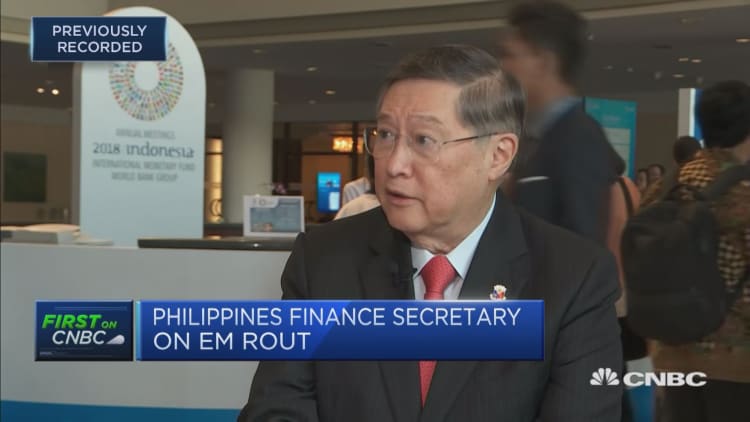
The Philippines is "being punished" for managing its economy in the right way, given the effect of tightening U.S. monetary policy on the embattled emerging market, Philippine Finance Secretary Carlos Dominguez suggested on Thursday.
Speaking to CNBC at the IMF and World Bank meetings in Bali, Indonesia, Dominguez said that the U.S. should consider that its actions "affect everybody."
"It affects the entire world, capital flows back to the U.S., and we're trying our darndest here, being punished for something we're doing right," he said, responding to the news that U.S. President Donald Trump said the Fed has "gone crazy" in continuing to raise interest rates.
The Philippine central bank in September raised rates for the fourth time in five months, and has signaled that it's prepared to tighten monetary policy further to support its currency, if needed.
Despite having already embarked on tightening, the Philippine peso has taken a battering from the recent emerging markets rout, which analysts have blamed partly on weak sentiment and a strong U.S. dollar pushed by rising rates.
Still, Dominguez said that the Southeast Asian country is in a "pretty good" position to deal with the emerging markets rout. He pointed to its "solid" foreign exchange reserves, strong banking system and fiscal position.
The Philippines will not cut its infrastructure spending just to be cautious about its deficit spending, he said, but instead may look into dialing down on non-infrastructure expenditure.
"Infrastructure for us is a real critical investment that we have to make," he said, adding that the Philippines only averaged 2.3 percent of GDP in infrastructure spending in the past 50 years.
"Our economy's choking. We have very bad traffic situation, our ports and airports need to be upgraded ... Some time in the future, we will have to re-think that this is the last thing we are going to cut," Dominguez said.


